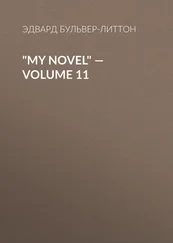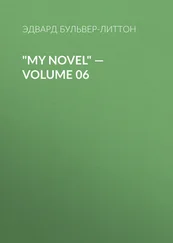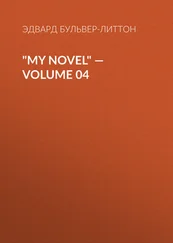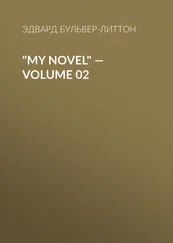Эдвард Бульвер-Литтон - My Novel — Complete
Здесь есть возможность читать онлайн «Эдвард Бульвер-Литтон - My Novel — Complete» — ознакомительный отрывок электронной книги совершенно бесплатно, а после прочтения отрывка купить полную версию. В некоторых случаях можно слушать аудио, скачать через торрент в формате fb2 и присутствует краткое содержание. Жанр: foreign_prose, literature_19, Европейская старинная литература, foreign_antique, на английском языке. Описание произведения, (предисловие) а так же отзывы посетителей доступны на портале библиотеки ЛибКат.
- Название:My Novel — Complete
- Автор:
- Жанр:
- Год:неизвестен
- ISBN:нет данных
- Рейтинг книги:5 / 5. Голосов: 1
-
Избранное:Добавить в избранное
- Отзывы:
-
Ваша оценка:
- 100
- 1
- 2
- 3
- 4
- 5
My Novel — Complete: краткое содержание, описание и аннотация
Предлагаем к чтению аннотацию, описание, краткое содержание или предисловие (зависит от того, что написал сам автор книги «My Novel — Complete»). Если вы не нашли необходимую информацию о книге — напишите в комментариях, мы постараемся отыскать её.
My Novel — Complete — читать онлайн ознакомительный отрывок
Ниже представлен текст книги, разбитый по страницам. Система сохранения места последней прочитанной страницы, позволяет с удобством читать онлайн бесплатно книгу «My Novel — Complete», без необходимости каждый раз заново искать на чём Вы остановились. Поставьте закладку, и сможете в любой момент перейти на страницу, на которой закончили чтение.
Интервал:
Закладка:
“Cousin Jemima’s hand,” said Frank, as directly as if the question had been put to him.
The Italian smiled. “Mr. Hazeldean has company staying with him?”
“No; that is, only Barney,—the captain. There’s seldom much company before the shooting season,” added Frank, with a slight sigh; “and then, you know, the holidays are over. For my part, I think we ought to break up a month later.”
The doctor seemed reassured by the first sentence in Frank’s reply, and, seating himself at the table, wrote his answer,—not hastily, as we English write, but with care and precision, like one accustomed to weigh the nature of words,—in that stiff Italian hand, which allows the writer so much time to think while he forms his letters. He did not, therefore, reply at once to Frank’s remark about the holidays, but was silent till he had concluded his note, read it three times over, sealed it by the taper he slowly lighted, and then, giving it to Frank, he said,
“For your sake, young gentleman, I regret that your holidays are so early; for mine, I must rejoice, since I accept the kind invitation you have rendered doubly gratifying by bringing it yourself.”
“Deuce take the fellow and his fine speeches! One don’t know which way to look,” thought English Frank.
The Italian smiled again, as if this time he had read the boy’s heart, without need of those piercing black eyes, and said, less ceremoniously than before, “You don’t care much for compliments, young gentleman?”
“No, I don’t indeed,” said Frank, heartily.
“So much the better for you, since your way in the world is made: it would be so much the worse if you had to make it!”
Frank looked puzzled: the thought was too deep for him, so he turned to the pictures.
“Those are very funny,” said he; “they seem capitally done. Who did ‘em?”
“Signoriuo Hazeldean, you are giving me what you refused yourself.”
“Eh?” said Frank, inquiringly.
“Compliments!”
“Oh—I—no; but they are well done: are n’t they, sir?”—
“Not particularly: you speak to the artist.”
“What! you painted them?”
“Yes.”
“And the pictures in the hall?”
“Those too.”
“Taken from nature, eh?”
“Nature,” said the Italian, sententiously, perhaps evasively, “lets nothing be taken from her.”
“Oh!” said Frank, puzzled again. “Well, I must wish you good morning, sir; I am very glad you are coming.”
“Without compliment?”
“Without compliment.”
“A rivedersi—good-by for the present, my young signorino. This way,” observing Frank make a bolt towards the wrong door. “Can I offer you a glass of wine?—it is pure, of our own making.”
“No, thank you, indeed, sir,” cried Frank, suddenly recollecting his father’s admonition. “Good-by, don’t trouble yourself, sir; I know any way now.”
But the bland Italian followed his guest to the wicket, where Frank had left the pony. The young gentleman, afraid lest so courteous a host should hold the stirrup for him, twitched off the bridle, and mounted in haste, not even staying to ask if the Italian could put him in the way to Rood Hall, of which way he was profoundly ignorant. The Italian’s eye followed the boy as he rode up the ascent in the lane, and the doctor sighed heavily. “The wiser we grow,” said he to himself, “the more we regret the age of our follies: it is better to gallop with a light heart up the stony hill than sit in the summer-house and cry ‘How true!’ to the stony truths of Machiavelli!”
With that he turned back into the belvidere; but he could not resume his studies. He remained some minutes gazing on the prospect, till the prospect reminded him of the fields which Jackeymo was bent on his hiring, and the fields reminded him of Lenny Fairfield. He returned to the house, and in a few moments re-emerged in his out-of-door trim, with cloak and umbrella, re-lighted his pipe, and strolled towards Hazeldean village.
Meanwhile Frank, after cantering on for some distance, stopped at a cottage, and there learned that there was a short cut across the fields to Rood Hall, by which he could save nearly three miles. Frank, however, missed the short cut, and came out into the high road; a turnpike-keeper, after first taking his toll, put him back again into the short cut; and finally, he got into some green lanes, where a dilapidated finger-post directed him to Rood. Late at noon, having ridden fifteen miles in the desire to reduce ten to seven, he came suddenly upon a wild and primitive piece of ground, that seemed half chase, half common, with crazy tumbledown cottages of villanous aspect scattered about in odd nooks and corners. Idle, dirty children were making mud-pies on the road; slovenly-looking women were plaiting straw at the threshold; a large but forlorn and decayed church, that seemed to say that the generation which saw it built was more pious than the generation which now resorted to it, stood boldly and nakedly out by the roadside.
“Is this the village of Rood?” asked Frank of a stout young man breaking stones on the road—sad sign that no better labour could be found for him!
The man sullenly nodded, and continued his work. “And where’s the Hall—Mr. Leslie’s?”
The man looked up in stolid surprise, and this time touched his hat.
“Be you going there?”
“Yes, if I can find out where it is.”
“I’ll show your honour,” said the boor, alertly.
Frank reined in the pony, and the man walked by his side. Frank was much of his father’s son, despite the difference of age, and that more fastidious change of manner which characterizes each succeeding race in the progress of civilization. Despite all his Eton finery, he was familiar with peasants, and had the quick eye of one country-born as to country matters.
“You don’t seem very well off in this village, my man?” said he, knowingly.
“Noa; there be a deal of distress here in the winter time, and summer too, for that matter; and the parish ben’t much help to a single man.”
“But surely the farmers want work here as well as elsewhere?”
“‘Deed, and there ben’t much farming work here,—most o’ the parish be all wild ground loike.”
“The poor have a right of common, I suppose,” said Frank, surveying a large assortment of vagabond birds and quadrupeds.
“Yes; neighbour Timmins keeps his geese on the common, and some has a cow, and them be neighbour Jowlas’s pigs. I don’t know if there’s a right, loike; but the folks at the Hall does all they can to help us, and that ben’t much: they ben’t as rich as some folks; but,” added the peasant, proudly, “they be as good blood as any in the shire.”
“I ‘m glad to see you like them, at all events.”
“Oh, yes, I likes them well eno’; mayhap you are at school with the young gentleman?”
“Yes,” said Frank.
“Ah, I heard the clergyman say as how Master Randal was a mighty clever lad, and would get rich some day. I ‘se sure I wish he would, for a poor squire makes a poor parish. There’s the Hall, sir.”
CHAPTER III
Frank looked right ahead, and saw a square house that, in spite of modern sash windows, was evidently of remote antiquity. A high conical roof; a stack of tall quaint chimney-pots of red-baked clay (like those at Sutton Place in Surrey) dominating over isolated vulgar smoke-conductors, of the ignoble fashion of present times; a dilapidated groin-work, encasing within a Tudor arch a door of the comfortable date of George III., and the peculiarly dingy and weather-stained appearance of the small finely-finished bricks, of which the habitation was built,—all showed the abode of former generations adapted with tasteless irreverence to the habits of descendants unenlightened by Pugin, or indifferent to the poetry of the past. The house had emerged suddenly upon Frank out of the gloomy waste land, for it was placed in a hollow, and sheltered from sight by a disorderly group of ragged, dismal, valetudinarian fir-trees, until an abrupt turn of the road cleared that screen, and left the desolate abode bare to the discontented eye. Frank dismounted; the man held his pony; and after smoothing his cravat, the smart Etonian sauntered up to the door, and startled the solitude of the place with a loud peal from the modern brass knocker,—a knock which instantly brought forth an astonished starling who had built under the eaves of the gable roof, and called up a cloud of sparrows, tomtits, and yellow-hammers, who had been regaling themselves amongst the litter of a slovenly farmyard that lay in full sight to the right of the house, fenced off by a primitive paintless wooden rail. In process of time a sow, accompanied by a thriving and inquisitive family, strolled up to the gate of the fence, and, leaning her nose on the lower bar of the gate, contemplated the visitor with much curiosity and some suspicion.
Читать дальшеИнтервал:
Закладка:
Похожие книги на «My Novel — Complete»
Представляем Вашему вниманию похожие книги на «My Novel — Complete» списком для выбора. Мы отобрали схожую по названию и смыслу литературу в надежде предоставить читателям больше вариантов отыскать новые, интересные, ещё непрочитанные произведения.
Обсуждение, отзывы о книге «My Novel — Complete» и просто собственные мнения читателей. Оставьте ваши комментарии, напишите, что Вы думаете о произведении, его смысле или главных героях. Укажите что конкретно понравилось, а что нет, и почему Вы так считаете.












